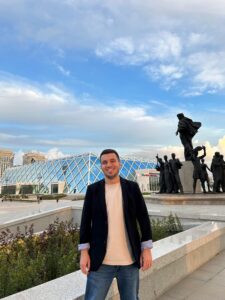ASTANA — Astana has become my second home with its futuristic skyline and biting winter winds, offering a unique blend of tradition and innovation. As a Turk living in this dynamic city, each day reveals new stories and cultural intersections.

Batuhan Aksu. Photo credit: personal archives
When I first arrived in 2019, I knew little about Astana. However, as I explored its streets, I was captivated by its modern and meticulous design. Unlike bustling Istanbul, Astana offered a sense of calm and serenity. After my initial visit, I planned to return, but the pandemic disrupted my plans. My second visit was not until 2021 when I was getting married.
Having traveled to nearly 30 countries, mostly in Europe, I noticed that many cities began to feel similar. Astana, however, stayed in my mind. It has a soul of its own despite being a relatively young city. In many ways, Astana feels more modern than several European cities. While many prefer Almaty for its social activities, breathtaking mountain views, and milder climate, I feel differently. I enjoy modern cities and feel that Astana’s harsh winters make me more focused and productive. I often lose focus in warmer climates, being drawn to shopping or outdoor activities. Here, the cold encourages me to prioritize work and personal growth with indoor activities when I need to unwind.
Astana has also given me the chance to share my experiences with a curious audience. Early on, I realized that information about life in Astana in foreign languages was insufficient. Motivated by my passion for storytelling, I started an Instagram page, @batuhaniche, to document the city’s landmarks, Kazakh culture, and daily life. For instance, I have shared videos on unique aspects of life here, such as filling a five-liter water bottle for just 50 tenge (US$0.095) or explaining the Kazakh’s “au” sound as a response. It sounds similar to the Turkish word for a wolf’s howl. This particular video resonated widely and even went viral, as Kazakh people appreciated a foreigner’s perspective on their culture.
Through my work as a blogger, I have become a bridge between cultures. I introduce followers to the vibrant Kazakh culture and share stories about life as a Turk abroad. Turks and Kazakhs share a deep bond rooted in our shared Turkic heritage. This connection comes alive in conversations, from discussing linguistic similarities to expressing mutual love for horse-based dishes.
One of the most rewarding aspects of living in Astana is the opportunity to share and learn. Recently, I co-hosted a Turkish breakfast event in the city, bringing together Kazakh and Turkish communities. We enjoyed traditional dishes, danced to Turkish music, and played games. The gathering led to new friendships and strengthened cultural ties. Seeing people connect because of this event filled me with pride. I plan to organize more events like this in the near future, further enriching our cultural exchange. I have also begun learning Kazakh more actively from the friends I have made there.
Astana has challenges, particularly in the winters, when temperatures plunge well below freezing, testing even the hardiest residents. Yet, I have learned to embrace the city’s icy beauty, especially during celebrations like New Year’s. Last year, I attended a midnight concert near the Kazakh Eli Monument. Despite the -10-degree weather, the streets buzzed with energy and joy, a sight I would never have imagined in Türkiye or Europe under such conditions.
Astana has taught me resilience, adaptability, and the significance of community. Whether navigating a snowstorm or sharing a meal with friends from diverse backgrounds, I feel deeply connected to this city.
My advice for those curious about exploring Astana is simple: embrace its rhythm, connect with its people, and let its unique mix of tradition and modernity surprise you. Living here is not just about adapting—it is about growing, learning, and thriving in a city as dynamic and resilient as its people.
The author is Batuhan Aksu, a graduate of political science and international relations and a passionate storyteller, sharing captivating narratives about culture, travel, and the world around us on his blog.
Disclaimer: The views and opinions expressed in this article are those of the author and do not necessarily reflect the position of The Astana Times.
